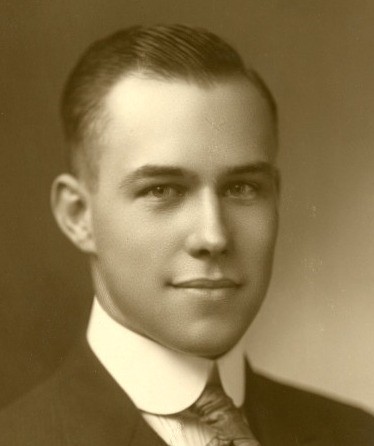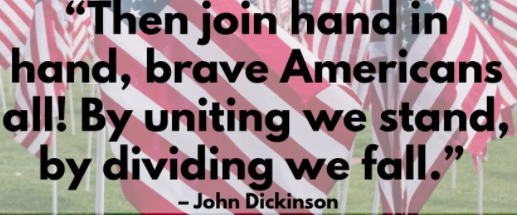
Happy Independence Day!
To commemorate our nation’s birthday, I’d like to tell you a story about a young man you’ve probably never heard of before. His name was Harry Burn, and it was just a little over 100 years ago this summer when he found himself confronted with a choice that would change the course of American history. It’s a bit long, but trust me…it’s worth the read.
The Year Was 1920
Harry was a 24-year-old politician from East Tennessee. As the youngest man in the state’s legislature, he no doubt expected his first years in politics to be uneventful. But Harry had arrived in Nashville just as his country arrived at a crossroads. Down one road lay a future that looked just like the past – where only men had the right to vote. Down the other was a future where women, too, could make their voices heard. A future where the government truly was, as Abraham Lincoln once said, of the people, by the people, and for the people.
Women’s Right to Vote
For decades, politicians had argued back and forth about whether women had the right to vote. Slowly, the tide of public opinion shifted, until the 19th Amendment to the Constitution – the one guaranteeing women the right to vote – was passed by Congress in 1919. But unlike lesser laws, constitutional amendments must be ratified by three-fourths of the states. In 1920, that meant thirty-six. Thirty-five had already voted in favor, but where the 36th vote would come from was still very much in doubt.
Ratify or Reject?
On that hot summer morning, the Tennessee House was locked in fierce debate. Should they ratify the 19th Amendment, or reject it? Neither side gave any quarter, and deadlock seemed inevitable. The House Speaker, who was very much against the 19th Amendment, proposed that they “table” the issue, meaning that they wait until the next legislative session before voting. But the suffragists knew that waiting was just a ploy to kill the issue entirely. So, the House took a vote on whether to table the amendment. The vote was 48 to 48. Deadlock. That meant the issue had to be decided then and there. There was little reason to believe that vote would come out any differently.
One man who had voted to table the amendment was Harry Burn. Not because he was personally against women’s suffrage, but because it was politically safer not to vote on the issue at all. Harry’s constituents were as divided as the House was, and he was up for reelection in the fall. If he voted the wrong way, he would almost certainly lose, and his political career would be over. Better, he thought, to sit on the fence.
It may seem incredible nowadays that the 19th Amendment was ever an issue. But to understand what Harry was going through, think about what the country was going through. From coast to coast, there had been protests, marches, and riots over various social issues. The nation was just emerging from a horrendous pandemic of the Spanish Flu – and smack in the middle of a deep recession. And everyone was gearing up for a bitter presidential election in the fall. Sound familiar?
Harry’s Vote
As the House prepared to vote again, Harry’s mind raced. Should he vote for or against? Should he ratify or reject? It was a quandary without an easy answer. But then he remembered something. It was a folded-up letter stuffed into his breast pocket. A letter from his mother.
Phoebe “Febb” Burn was a widowed farmer. Most of her days were given over to farming, cooking, cleaning, and sewing for her family. But she had also been a schoolteacher, and despite her near-constant labor, she still found time to read four different newspapers every day, and a dozen magazines every month. She was as informed as any politician, and equally fervent. So, when she saw in the news that the House would be voting on the 19th Amendment, she decided it was time to write her son a letter.
Harry, she wrote, I wish you were home. Write your mother every time you have a chance, for I am always looking for a letter when you are away. Hurray and vote for suffrage and don’t keep them in doubt. I’ve been waiting to see how you stood but have not seen anything yet. Don’t forget to be a good boy. With lots of love, Mama.1
The House clerk began calling the roll. One by one, the lawmakers voted. The “ayes” were in favor of ratification, the “nays” against. Then the clerk called Harry’s name. Every eye in the chamber turned to him, waiting to see which way he’d go. Political expediency demanded one thing; his mother’s wisdom, another. Harry felt for the letter one last time. Then, he hopped off the fence.
“Always vote for principle,” John Quincy Adams once said, “though you vote alone, and you may cherish the sweetest reflection that your vote is never lost.”
Harry voted “Aye.”
At first, everyone thought it was a mistake. They had misheard – or Harry had misspoken. But when Harry assured them he’d said what he meant, and meant what he said, the chamber exploded. Some shouted that he was a traitor. Some screamed assertions about his manhood. Soon, anti-suffrage newspapers made baseless claims that he’d been paid to change his vote. Rivals worked around the clock to unseat him in the next election. Others threatened to kill him. Some even confronted his mother. But through it all, Harry held firm.
Mother’s Advice
“I changed my vote,” he later said, “because I believe in suffrage as a right – and because I knew that a mother’s advice is always safest for a boy to follow. And my mother wanted me to vote for ratification.”2
And so, the Constitution was amended. Suffrage became the law of the land.
That was over one hundred years ago. The reason I’m sharing this story is because when I read about it, I was struck by how similar our two time periods are. Today, in 2021, we have been through a global pandemic and another bitterly contested presidential election. Protests rage from coast to coast about issues like liberty and rights, freedom and equality. Just like in Harry Burn’s time.
It’s easy to feel overwhelmed by it all. Easy to think that our nation is more divided than ever before.
And yet, when we study history, we realize that’s not so. The questions we’re asking today are the same, or similar, to the questions our grandparents were asking – and their grandparents before them.
I don’t have all the answers. I suspect no one does, and that America will still be wrestling with these issues long after we’re gone. But the fact that we all play a part in searching for those answers is one of the reasons Independence Day is WORTH celebrating.
In the Preamble to the Constitution, the Founders wrote that the entire point of the Constitution was “to form a more perfect Union.” Because that’s what our country is. A union. Not just a union of states, but of people – all with different beliefs, philosophies, traditions, origins, and stories. Even in divisive times like today, we are still a union. A union we must continue to perfect, building on the work of those that came before us. Just as Harry Burn built on the work that came before him.
 That’s why, as we prepare to celebrate another Independence Day, I don’t feel despair for the challenges that face our nation. Because America has faced all those challenges before – and come through it stronger. I’m sure there were people in 1920 who felt the union was coming apart at the seams. But it didn’t. Nor will it today. The Founders knew that so long as the American people continued to work, to vote, to care about their country, it would survive. They knew that if we faced our problems bravely and honestly, we would emerge better for the experience. Just as Harry Burn and all those who lived 100+ years ago did.
That’s why, as we prepare to celebrate another Independence Day, I don’t feel despair for the challenges that face our nation. Because America has faced all those challenges before – and come through it stronger. I’m sure there were people in 1920 who felt the union was coming apart at the seams. But it didn’t. Nor will it today. The Founders knew that so long as the American people continued to work, to vote, to care about their country, it would survive. They knew that if we faced our problems bravely and honestly, we would emerge better for the experience. Just as Harry Burn and all those who lived 100+ years ago did.
I’m so grateful to live in a country where you don’t have to be royalty to make a difference. A country where a 24-year-old from rural Tennessee, who few had ever heard of, can change the course of history. A country where we ALL play a role in perfecting this messy, mixed-up, beautiful union.
So, from all of us at 2ndHalf Wealth, I wish you a safe and happy Independence Day. And to anyone reading this 100 years from now, don’t worry, have faith. Whatever challenges you’re facing, you’ll overcome them.
Just like we will.




